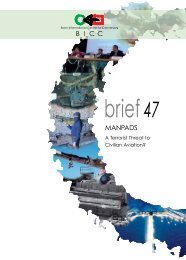egypt-final-presidential-elections-2012
egypt-final-presidential-elections-2012
egypt-final-presidential-elections-2012
You also want an ePaper? Increase the reach of your titles
YUMPU automatically turns print PDFs into web optimized ePapers that Google loves.
The Carter Center<br />
Presidential Election in Egypt<br />
from any decisions taken by an election management<br />
body. In accordance with Egypt’s international obligations,<br />
this tribunal should be independent of, and<br />
perceived as independent of, the election management<br />
body. 38<br />
The problem of the PEC’s ultimate authority over<br />
decision-making was compounded by the apparent<br />
conflict of interest that PEC members have with the<br />
courts. By law, the PEC is chaired by the head of<br />
the Supreme Constitutional Court. The other four<br />
members are all senior judges<br />
from the various major<br />
judicial systems of Egypt. In<br />
cases where the PEC refers<br />
matters such as campaign<br />
or election-day violations<br />
to the ordinary courts, or<br />
refers constitutional matters<br />
such as the validity of the<br />
political exclusion law to<br />
the Supreme Constitutional<br />
Court, it is reasonable for<br />
one to assume that the courts might show favoritism<br />
to the PEC. Even the appearance of a conflict of<br />
interest in these cases damages the perceived impartiality<br />
of the courts in hearing matters involving the<br />
PEC, which runs counter to international good practice.<br />
39 In response to these issues, The Carter Center<br />
recommends establishing a permanent, independent<br />
electoral management body and ending the appointment<br />
of judges to leadership positions within the<br />
election management body solely on the basis of the<br />
seniority of their judicial positions.<br />
Attempts To Reinstate State of Emergency<br />
Conditions in Egypt: On May 31, <strong>2012</strong>, the<br />
Emergency Law, under which Egypt had been<br />
governed continuously since 1981, expired. 40 On<br />
June 13, <strong>2012</strong>, however, the Ministry of Justice<br />
issued a decision that would have allowed military<br />
police and intelligence officials to arrest civilians<br />
for a range of crimes typically considered in civilian<br />
courts, including spreading false information with the<br />
intent of injuring national security and “insulting”<br />
The Carter Center commends<br />
Egyptian leaders for allowing the<br />
Emergency Law to lapse without<br />
renewal but remains concerned about<br />
attempts by authorities to reinstate<br />
emergency provisions by other means.<br />
21<br />
public officials. 41 On June 26, following the second<br />
round of the election, the administrative court<br />
declared this decision invalid, stating that it violated<br />
the Constitutional Declaration and Egypt’s Code of<br />
Criminal Procedure. 42<br />
The Carter Center commends Egyptian leaders for<br />
allowing the Emergency Law to lapse without renewal<br />
but remains concerned about attempts by authorities<br />
to reinstate emergency provisions by other means.<br />
The electoral process relies on free expression by<br />
candidates and their agents<br />
and by voters to operate<br />
effectively. Attempts to<br />
reinstate restrictive provisions<br />
of the Emergency Law<br />
are likely to have a chilling<br />
effect on political expression<br />
and contravene Egypt’s<br />
international commitments<br />
to guarantee freedom of<br />
expression for its citizens. 43<br />
Disenfranchisement: The<br />
enjoyment of the right to vote is a primary indicator<br />
of the health of electoral democracy. 44 Egypt’s<br />
commitment to the principles of universal suffrage<br />
requires that the right to vote be extended to the<br />
38 UNHRC, General Comment No. 31, para. 15; AU, African Union<br />
Declaration on the Principles Governing Democratic Elections in Africa,<br />
para. 3<br />
39 UNHRC, General Comment No. 32, para. 19; AU, African Union<br />
Declaration on the Principles Governing Democratic Elections in Africa,<br />
para. 3<br />
40 It had been most recently reimposed for a two-year period by the<br />
Mubarak regime in May 2010.<br />
41 Decision No. 4991; Human Rights Watch, Military Power Grab<br />
Creates Conditions for Abuse, June 21, <strong>2012</strong><br />
42 On June 14, five human rights NGOs filed a case against the head<br />
of the SCAF, the minister of justice, the minister of defense, the public<br />
prosecutor, the chief of military justice, and the military prosecutor,<br />
demanding the immediate end of the decision.<br />
43 U.N., ICCPR, Article 10; UNHRC, General Comment 25, para. 19<br />
44 U.N., ICCPR, Article 25 (b); Universal Declaration of Human Rights,<br />
Article 21(3): “The will of the people shall be the basis of the authority of<br />
government; this will shall be expressed in periodic and genuine <strong>elections</strong><br />
which shall be by universal and equal suffrage and shall be held by secret<br />
vote or by equivalent free voting procedures.”



